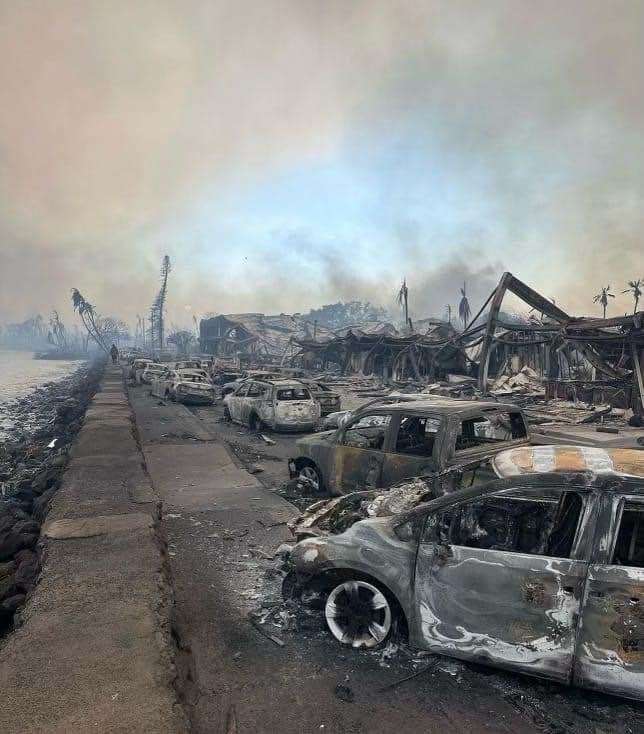Fire damage in the town of Lahaina. Photo Credit: U.S. Civil Air Patrol
The Maui fire was no mere “natural disaster,” and the ongoing crisis is more than just a tragedy. The deadliest wildfire in US history is the result of colonization and extractivism.
This unprecedented event could never have been imagined within the traditional lifeways of the indigenous inhabitants of Hawai’i, who took great care to conserve and improve the lush tropical landscape. In recent years, climate change has led to decreased rainfall throughout the islands. But even worse, decades of greedy sugar plantation owners, followed by cattle ranchers, and then luxury tourist resorts and golf courses, had depleted the groundwater, destroyed the wetlands, and covered the hills with non-native grasses that burned quick and hot.
Now, as locals struggle to recover and care for each other in the midst of horrific devastation, the vultures of disaster capitalism attempt to steal their homes. Residents are receiving cold calls from realtors, offering them paltry sums for their ancestral lands. Recently passed reforms to water permitting have been suspended, and opportunistic corporations are lobbying to eliminate water protections completely. You can learn much more about the details of how this is being done in this excellent article by Naomi Klein and Kapua’ala Sproat.
Disaster profiteers attack easy prey. In most cases, this means the communities that have been historically first and most harmed by colonization and exploitation, and therefore have the least means to protect themselves and fight back. We have seen this in the wake of many of the worst disasters, especially Hurricane Katrina in New Orleans and Hurricane Maria in Puerto Rico. We will surely see more of it in the future, as the fires and floods continue to increase.
For this reason, it is more important than ever to prioritize community organizing, building sustainable local economies and deep bonds with our neighbors and environment. The just transition movement must center this holistic vision. Good union jobs lead not only to comfortable families but also to strong feelings of camaraderie, solidarity, and commitment to collective success.
The silver lining that we always see in disaster zones is the beautiful examples of mutual aid, grassroots relief and rebuilding in spite of many obstacles. This is especially true in Hawai’i, where the spirit of aloha ‘āina – “love of the land” – is inspiring locals to not only help each other, but also to stand firm in protecting their land and lifeways (as indigenous Hawaiians have already been doing very actively in recent decades).
In her excellent book A Paradise Built in Hell, Rebecca Solnit recounts a diary entry from labor leader Dorothy Day, who was 9 years old during the cataclysmic 1906 San Francisco earthquake: “While the crisis lasted, people loved each other.” The just transition movement envisions a world where we can share this love for each other, our environments, communities and cultures, and build something better in the midst of unfolding crises. We salute all the heroes on the frontlines in Maui and every place burdened by disasters big and small, historic and current, and we call on everyone to support their struggles.

